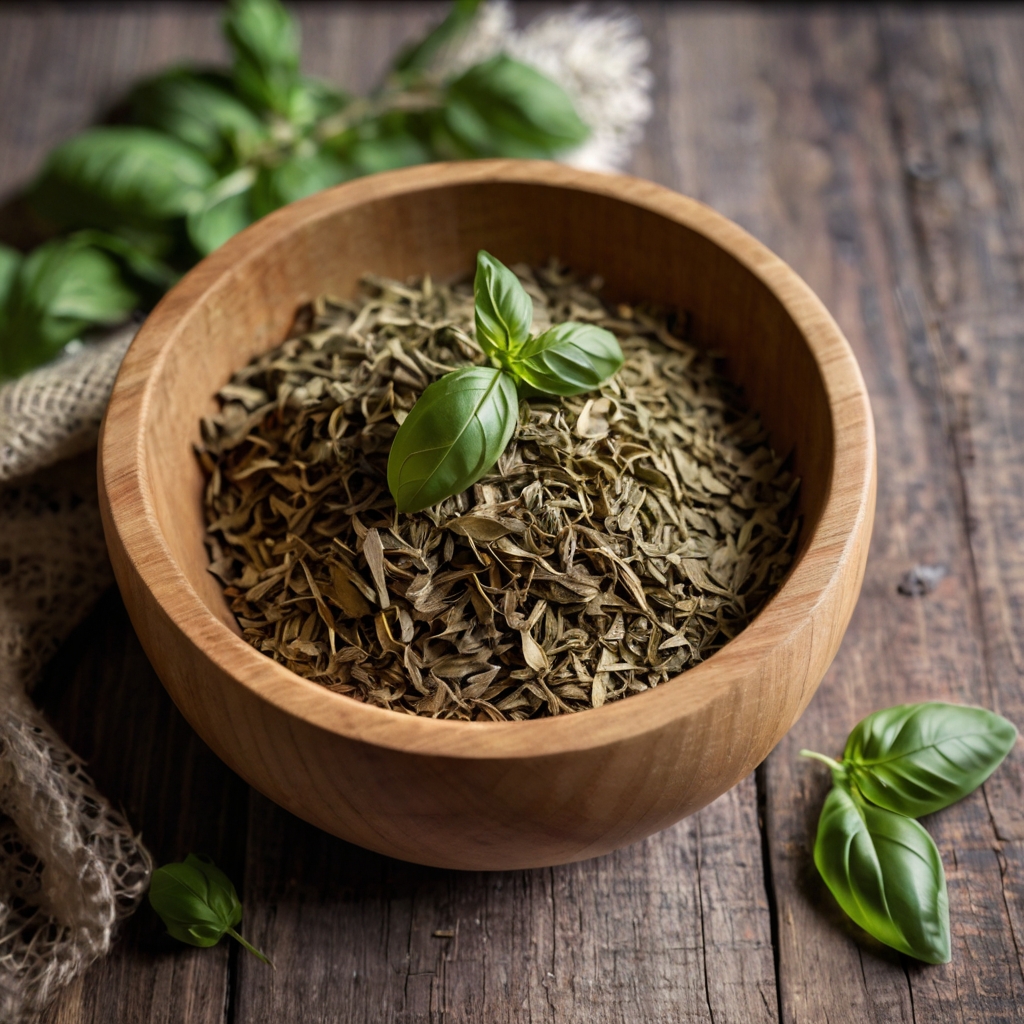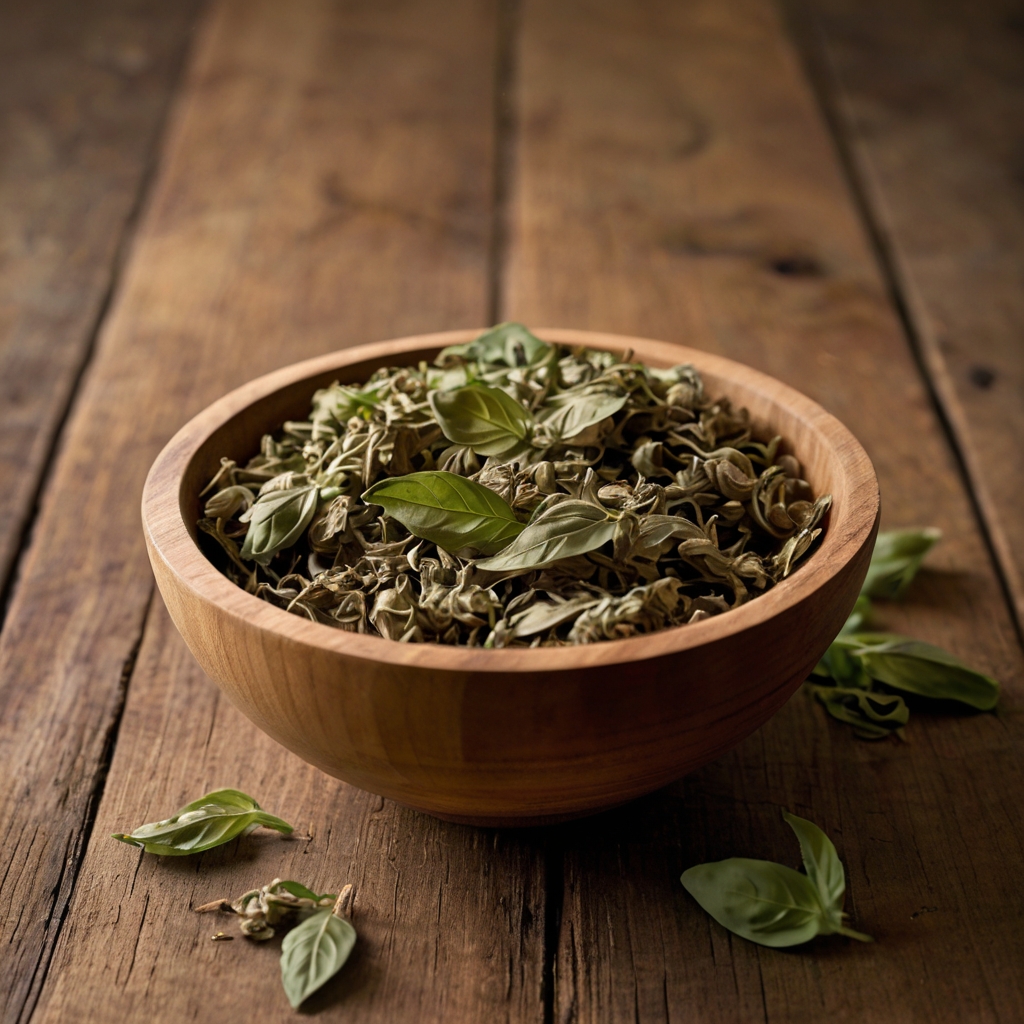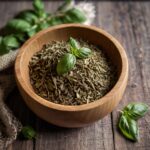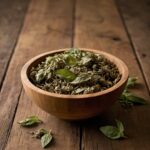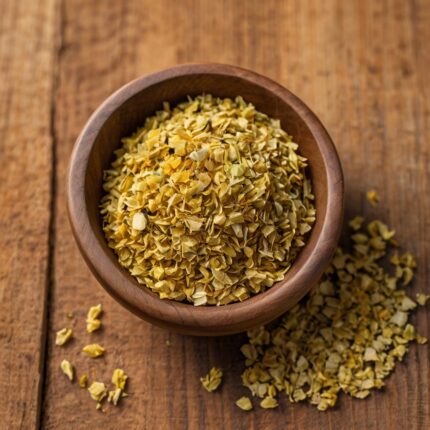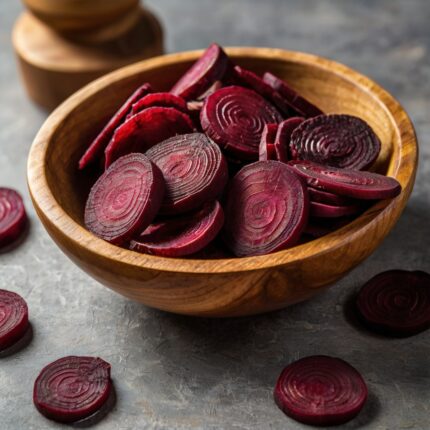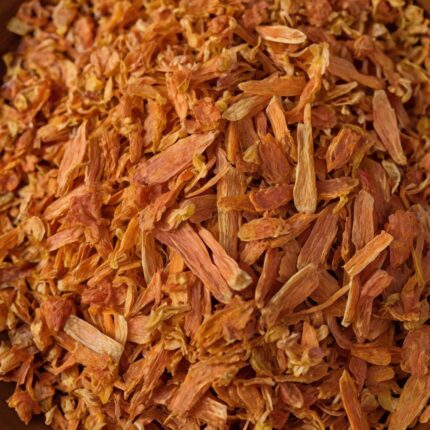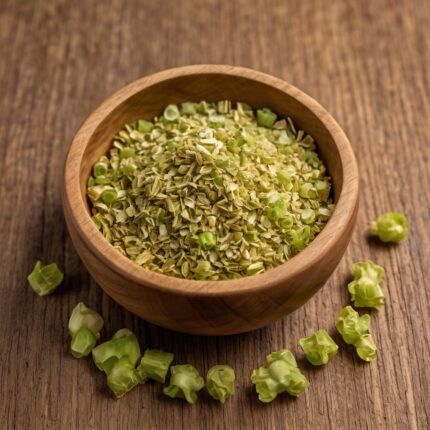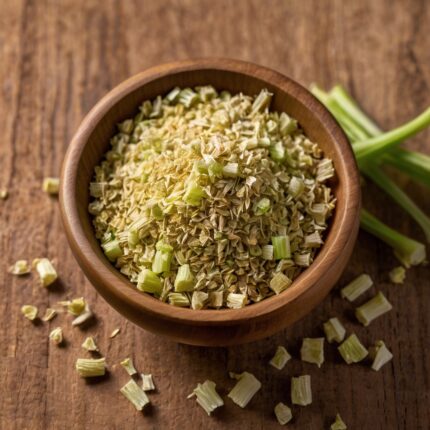Dried basil (Ocimum basilicum) is the dried form of fresh basil. This fragrant plant is used in many cuisines, especially in Mediterranean, Italian, and Southeast Asian dishes. Dried basil retains much of its aromatic quality, although its flavor is more concentrated compared to fresh basil, which has a milder, slightly peppery taste with hints of licorice and cloves. Dried basil is an excellent way to store this herb for long-term use and provides a good option for seasoning food when fresh basil is not available.
Nutritional information for 100 grams of dried basil:
Dried basil is a concentrated source of the nutrients found in fresh basil and provides a significant amount of fiber, vitamins, and minerals even in small quantities.
Vitamins:
– Vitamin A: 5000 to 7000 IU (important for vision and immune system function)
– Vitamin C: 50 mg (supports the immune system, skin health, and iron absorption)
– Vitamin K: 380 mcg (essential for blood clotting and bone health)
– Folate: 250 mcg (important for cell growth and DNA synthesis)
– Vitamin B6: 0.3 to 0.5 mg (supports brain function and metabolism)
Minerals:
– Calcium: 1500 mg (vital for bone health)
– Iron: 30 mg (important for oxygen transport in the blood)
– Magnesium: 220 mg (essential for muscle and nerve function)
– Potassium: 1700 mg (helps regulate blood pressure and muscle function)
– Zinc: 3 mg (supports immune function and enzyme activity)
Applications of Dried Basil:
1. Culinary Uses:
Dried basil is a versatile herb used in many dishes. Although it lacks the bright, fresh flavor of fresh basil, it provides a concentrated and slightly earthy taste that enhances the flavor of many foods:
Italian and Mediterranean Dishes:Dried basil is a key ingredient in Italian dishes such as tomato sauce, pizza, and pasta dishes like Pasta Marinara or pesto (although fresh basil is typically used for pesto). It is also one of the essential spices in Mediterranean recipes like Greek salad and Eggplant Parmigiana.
Soups and Stews:Dried basil works well in soups and stews, especially in tomato-based soups, minestrone, or vegetable soups. Its concentrated flavor adds a deeper taste to the broth.
Spice Blends:Dried basil is often included in spice blends such as Italian seasoning, Herbes de Provence, and pizza seasoning. It can also be used to flavor pickles, sauces, and broths.
Meat Dishes: Dried basil pairs well with meat dishes, especially those involving chicken, lamb, or pork. It complements grilled or barbecued meats and works well as part of a seasoning mix or marinade.
**Vegetable Dishes: Dried basil can be sprinkled on roasted vegetables, especially tomatoes, zucchini, eggplant, or potatoes. This generally enhances the overall flavor of the dish.
Rice and Grains: You can sprinkle dried basil on rice or quinoa to add a herbal note to grain-based dishes.
*Sauces and Liquids:* Dried basil can be used in sauces, pico de gallo, or other liquids where a herbal flavor is desired but fresh basil is not available.
۲. Medicinal and health applications:
Anti-inflammatory: The essential oils in basil, particularly eugenol, have natural anti-inflammatory properties. This can help with conditions such as arthritis, inflammatory bowel disease, or general muscle inflammation.
Aiding digestion: Basil has been traditionally used to address digestive issues such as stomach discomfort, bloating, and stomach cramps. It can also help stimulate appetite and alleviate nausea.
Antibacterial and antifungal: Basil has mild antibacterial and antifungal properties and is sometimes used as a natural remedy to treat infections and prevent the growth of bacteria in the body.
Adaptogenic properties: Basil is considered an adaptogen, meaning it may help the body adapt to stress and promote a sense of calm. It is often used in Ayurvedic medicine to help with fatigue, anxiety, and stress relief.
Cholesterol and blood sugar management: Some studies suggest that basil may help reduce cholesterol levels and stabilize blood sugar levels, making it beneficial for individuals at risk of heart disease or diabetes.
۳. Aromatherapy:
Essential oil: Basil essential oil (which can be extracted from fresh or dried basil) is used in aromatherapy due to its calming and invigorating properties. It can reduce mental fatigue, relieve tension, and enhance mental clarity. It is also used to alleviate headaches, improve focus, and reduce symptoms of anxiety and stress.
Inhalation: Basil essential oil can be diffused in a room to improve focus and create an uplifting atmosphere. It is sometimes added to bathwater or used in steam inhalation to support respiratory health.
۴. Skincare
Acne treatment: Due to its antibacterial properties, basil can be used in topical applications to prevent and treat acne. Basil extracts or basil oil are often included in natural skincare products designed to combat acne and oily skin.
Anti-aging: The antioxidants in basil help combat free radical damage and may assist in preventing signs of premature aging, such as wrinkles and fine lines. Basil extracts are sometimes found in creams and lotions that claim to promote younger-looking skin.
۵. Natural pest repellent:
Insect repellent: Basil is believed to repel certain insects, including mosquitoes. Dried basil leaves can be placed in drawers, closets, or outdoor areas to prevent insects from entering. Additionally, basil essential oil can be used in homemade insect-repellent sprays.
| Nutritional Content | Amount per 100 grams of dried basil | :
| Calories | 251 |
| Protein | 22 g |
| Fat | 4 g |
| Saturated Fat | 0.5 g |
| Carbohydrates | 58 g |
| Fiber | 40 g |
| Sugar | 0.5 g |
